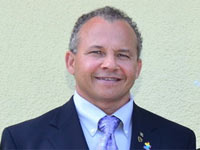
A leading Realtor is urging government to reverse its increase in stamp tax on real property transactions, saying “12% of zero is zero,” and declaring that multiple gains from a competitive tax rate far outweigh potential losses resulting from higher taxes.
Mario Carey, CRS, CIPS, CLHMS, president of Mario Carey Realty and one of the few Realtors in the region to hold a Bachelor’s degree in real estate, said a 12% stamp tax imposed in 2010 on all property transactions of more than $250,000 coupled with increases in annual property tax is costing The Bahamas much-needed business and discouraging both local and foreign buyers.
Government coffers and The Bahamas as a whole, he says, stand to benefit from providing incentives that spur housing sales and broad spin-off economic activity.
“I am happy to go on the record saying government’s accomplishments and overall real estate policies have been nothing short of remarkable and I understand the need to find additional revenue sources,” said Carey. “But I think the way to go about it is to encourage sales, appreciating how much a single sale in the luxury market benefits The Bahamas as a whole and how all sales, regardless of price, spell benefits through the ripple effect.”
Higher fees in stamp tax and annual property tax has been on a quiet boil since the new fees were announced in June 2010, taking the real estate industry by surprise at a time when the international housing market was suffering its worst slump since the Great Depression of 1929.
But few in the profession were willing to speak up, though several said quietly they had lost sales. Another leading Realtor said she had clients who are “fearful of the high cost of uncertainty” particularly about property tax in the Family Islands. In some cases, the one-time major jump drove annual bills that had been in the range of $35,000 to more than $100,000.
This week Carey broke the silence, citing countries like China where the government is encouraging new opportunities for ownership by offering financial incentives – a stamp tax of 2% and no annual property tax. In Panama, he said, government has initiated a 20-year exemption from real property tax for the same reason – to spur activity in real estate where ownership creates a ripple effect, fueling jobs in everything from construction to long-term staffing, boosting revenue and economic activity.
Earlier this month, US Federal reserve Chairman Ben Bernanke, who consistently refers to the driving force of the real estate sector, said in a widely covered speech, “a resurgent housing sector helps fuel re-employment.” The Fed had cut interest rates to near zero to drive housing sales and activity in 2008 and Bernanke remains convinced transactions in housing are at the heart of economic recovery, both as a driver and a reflection of the general economic climate.
“In Ecuador, the hottest new real estate market in this part of the world, especially for retirees, property tax on a very decent home in an urban area may run about $100 per year and in a rural area as little as $7.50,” said Carey. “Ecuador has a standard 12% VAT tax which is very important as a revenue generator for the government – but it is deliberately not applied to real estate transactions because government wants to encourage home ownership and activity.”
“Unfortunately, The Bahamas has become a less attractive jurisdiction because of the fees associated with purchasing and ownership here,” he said. “Purchase costs of price plus 18% coupled with the rising cost of annual real property tax and the uncertainty of the amount of property tax can be a lethal blow to a sale in a luxury market where the prospective buyer may own a private aircraft or a mega-yacht and is just as comfortable in Panama where he does not have to pay property tax for 20 years.”
Carey cited a long list of direct and indirect benefits from a single sale of a high-end property.
“This is a real-life example based on a sale I made recently on Paradise Island,” he said. “The list of persons who benefit from that single sale begins at the airport – NAD, the porter, the cab driver. Then the bellman at the door of the One & Only Ocean Club where they stayed for one week, the staff at the check-in counter. They ordered two meals a day so all the waiters, bus boys, chefs, dishwashers and other staff benefited. The Buyers paid the room rate plus taxes which benefited the Bahamas Hotel Association, the Nassau Paradise Island Promotion Board and Ministry of Tourism. They shopped and dined downtown. That means more cab fares and benefits to retailers on Bay Street, store clerks and restaurants.”
After three days of viewing properties, the couple made an offer on a condo.
“Now they had two real estate brokers plus staff employed on the buyers’ and seller’s behalf, two lawyers who also have staff and in each of those offices, they are paying rent, electricity, using computers, maintaining telephone service, internet.” It continues — the privately hired building inspector who produces a report on the unit’s condition, the independent appraiser who assesses value, the banker who lends the money, the title search company, all the repairmen who make modest improvements in plumbing, painting, cleaning carpets.
“At closing, there are the movers. New owners now shop for furniture and televisions. They go to the grocery, hardware, household and drug stores. They purchase a new car and take out insurance. The car will need gas, repairs, cleaning and inspection. Then they will have a housekeeper. They pay BEC, BTC, Cable Bahamas, Water & Sewerage and monthly fees living on Paradise Island plus daily bridge tolls.”
The buyer is only part of the picture.
“The seller now needs a place to live,” he says. “He decides to rent for the time being. Who benefits? The rental agents who have a large office to run, the movers, the handyman, the pool cleaner and it never really stops. The government makes its stamp duty on the sale, duty on all furniture, the car and business license that has to be paid by all those who service the buyers.”
According to Carey, in the US, every time a house sells it is equal to three full-time jobs.
“I have a client who has gone to Turks & Caicos where real property tax has been removed and stamp tax has been reduced to a maximum of 10% payable over a 3-year period and other clients who are nervous about the uncertainty of the cost of purchase and ownership.”
Carey is convinced a change in policy will lead to an increase in sales and employment.
“With the current unemployment rate being 15.9%, coupled with the recent increase in persons living on less than $5,000 per year and the decline in the middle class population, any opportunity to make a change should be a priority,” he said. “I hope that the government addresses the current stamp tax policy and considers lowering the rate in order to create jobs which we urgently need. When luxury housing sales are down, the people who suffer most are those in the middle income category. When the housing market is active, everyone wins. We cannot afford to lose one single real estate transaction. Twelve percent of zero is zero.”
Diane Phillips & Associates



